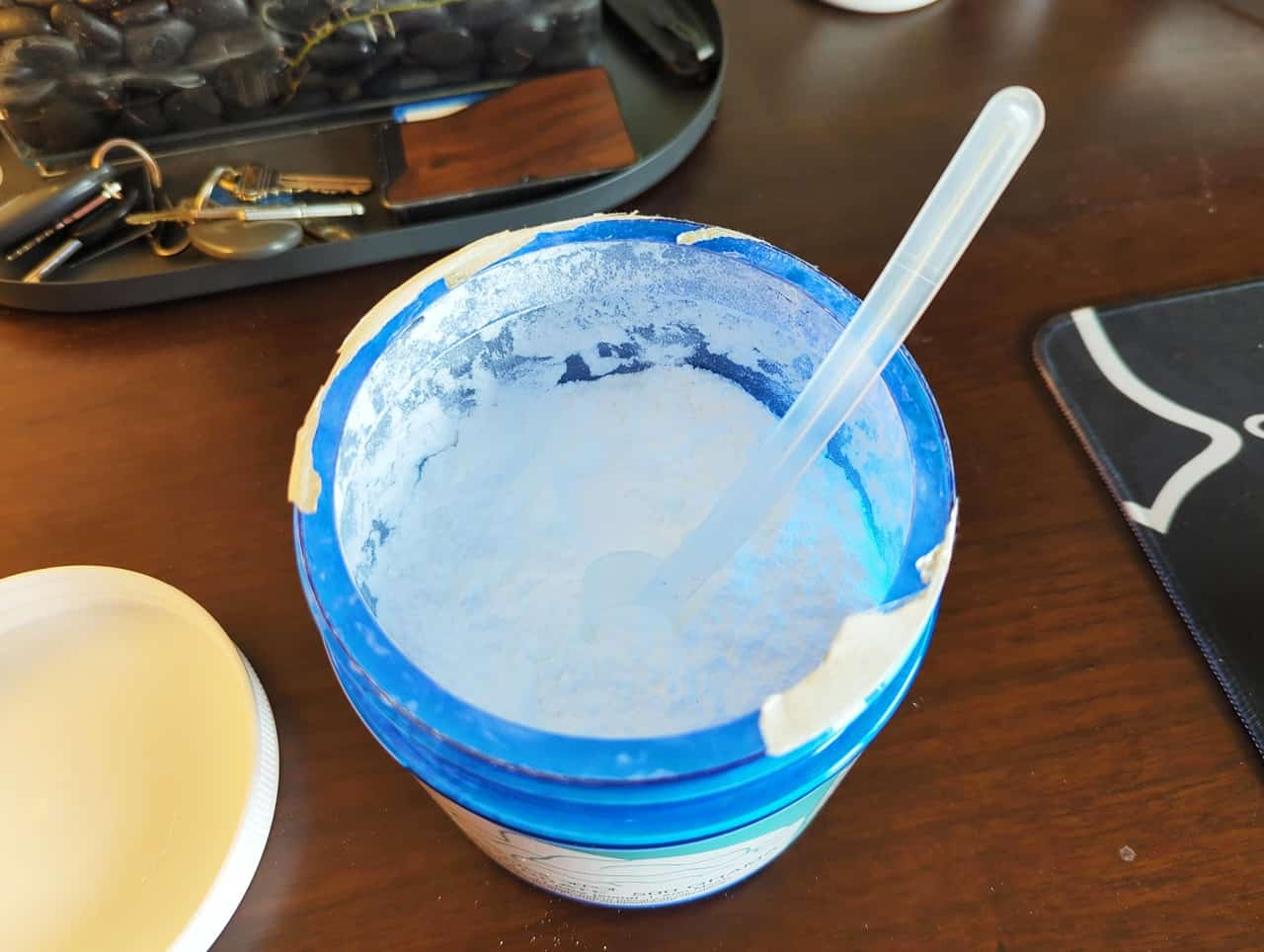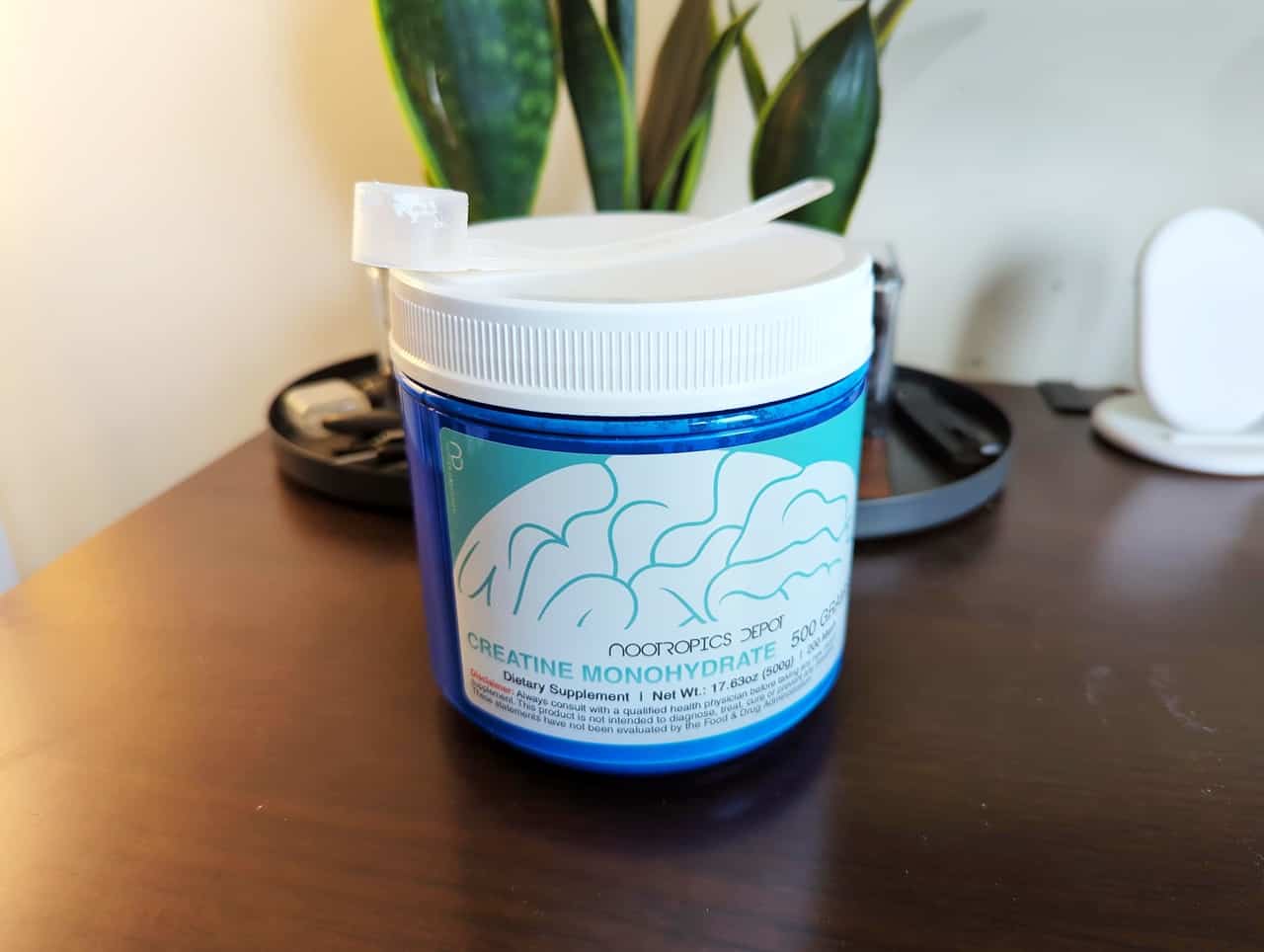Imagine simply unlocking your brain’s hidden potential by adding a powerful, science-backed ingredient to your daily routine. That secret weapon is creatine, a naturally-occurring compound that can enhance cognitive function and support optimal brain health.
In this blog post, we’ll explore the fascinating world of creatine as a nootropic—which means it has the ability to improve mental performance—by delving into its impact on cognition, memory, focus, and even neuroprotection.
Key Takeaways
- Creatine is a naturally occurring amino acid found in muscle tissue that enhances cognitive function and supports optimal brain health by aiding the production of energy to fuel cellular functions during high-intensity physical activities.
- Creatine supplementation has been shown to enhance mental energy, focus, cognitive performance, and memory retention. It also provides neuroprotective properties that reduce inflammation within various brain cells and protects neurons from oxidative stress and free radicals contributing to age-related cognitive decline.
- Vegetarians and vegans especially benefit from creatine supplementation as they don’t consume as much dietary creatine as meat-eaters, making them more likely to have a deficiency. The recommended dosage for creatine supplementation is 5 grams per day, taken at the same time every day or following a loading phase of 20 grams daily for 5-7 days, followed by a maintenance dose of 5 grams daily.
Table of Contents
Understanding Creatine: What Is It And How Does It Impact Cognitive Function?

Creatine is a naturally occurring amino acid found in muscle tissue and has been shown to have beneficial effects on cognitive function, including improved memory and learning.
Key Functions And Natural Sources Of Creatine
Creatine is a naturally occurring substance in the human body, primarily found in our muscles and brain. Its primary function involves aiding the production of adenosine triphosphate (ATP), which is responsible for providing energy to fuel cellular functions during high-intensity physical activities.
One of the extraordinary aspects of creatine is its abundance in natural sources such as red meat, fish, and poultry. For instance, consuming around 2-3 pounds of raw red meat or about a pound and a half of salmon provides approximately 5 grams of creatine – which incidentally happens to be the standard daily supplementary dose for athletes aiming to increase their muscular endurance.
It’s important for body hackers seeking improved cognitive functioning through better nutrition intake to understand that adding creatine supplementation into their routine may offer tangible benefits.
As research continues to explore the connection between adequate dietary creatine levels and enhanced mental performance, forward-thinking individuals have an exciting opportunity: leveraging this powerful nootropic compound for physical gains and optimizing brain health and function.
Evidence Of Creatine’s Impact On The Brain And Benefits For Brain Health
There is a growing body of evidence showcasing the impressive impact of creatine on brain health and cognitive function. Researchers have found that creatine supplementation can potentially play a critical role in neuroprotection by increasing energy production and reducing oxidative stress in the brain.
Additionally, studies have indicated that increased intake of creatine leads to improved cognitive function, which mirrors its well-known effects on muscle strength and heart health.
Creatine’s ability to support optimal energy production in the brain contributes significantly to enhanced mental focus, memory retention, and overall cognitive performance.
Furthermore, research has also suggested that creatine may provide notable benefits for fighting certain neurological diseases such as Parkinson’s and Alzheimer’s. The neuroprotective properties of this powerful supplement could be due to its capacity for boosting ATP levels and reducing inflammation within various brain cells.
How Does Creatine Work As A Nootropic?
Creatine works as a nootropic by enhancing energy, focus, cognitive performance, memory, and learning, as well as providing neuroprotective properties and improving brain metabolism.
Enhanced Energy, Focus, And Cognitive Performance
One of the most appealing benefits of creatine as a nootropic is its ability to enhance energy, focus, and cognitive performance. As body hackers, you are constantly seeking ways to optimize mental and physical capabilities.
For instance, a study conducted on sleep-deprived participants showed that those who were supplemented with creatine demonstrated improved accuracy and speed during cognitive tasks compared to individuals receiving a placebo.
This boost in mental energy helps with your daily activities and enhances your abilities during intense training sessions or competitions.
Improved Memory And Learning
Creatine supplementation has been found to enhance memory and learning abilities. Studies have shown that taking creatine as a nootropic can improve working memory and overall cognitive performance.
Creatine also plays a role in the formation of long-term memories by increasing ATP production in brain cells. Higher levels of ATP lead to an increase in neurotransmitter release, which improves communication between neurons and enhances memory consolidation.
In addition, creatine has been shown to reduce mental fatigue during tasks requiring sustained attention, allowing individuals to stay focused and process information more effectively.
Increased Neuroprotective Properties And Brain Metabolism
Creatine supplementation has been shown to provide neuroprotective benefits and improve brain metabolism. In fact, studies have indicated that creatine may help reduce the risk of neurodegenerative diseases like Parkinson’s and Alzheimer’s.
Furthermore, creatine supplementation increases phosphocreatine concentrations in the brain, which helps protect neurons from oxidative stress and free radicals- both factors known to contribute to age-related cognitive decline.
The Science-Backed Benefits Of Creatine For Brain Health

Discover the impressive benefits of creatine for brain health, including protection against neurodegenerative diseases and enhancement of mood and cognitive function.
Protection Against Neurodegenerative Diseases
Creatine supplementation has shown promising results in protecting against neurodegenerative diseases like Parkinson’s and Alzheimer’s. Studies have indicated that creatine can improve brain function, similar to the effects found in muscle and heart.
In addition, research has suggested that creatine may help alleviate symptoms related to energy dysregulation commonly seen in these conditions. While more studies are needed to better understand the full extent of creatine’s potential benefits on neurodegenerative diseases, it is considered one of the most effective cognitive enhancers available today.
Enhancement Of Mood And Overall Brain Health
Creatine supplementation has been shown to enhance cognitive function and improve mood and overall brain health. Studies have indicated that increased creatine intake can result in improved stress resilience, depression, and memory.
One study found that creatine supplementation significantly reduced symptoms of depression in women with major depressive disorder compared to those who took a placebo. Another trial showed that creatine augmented measures of cognitive function, including mood ratings, especially when combined with exercise.
Support For Cognitive Function In Vegetarians And Vegans
Creatine supplementation has been found to be particularly beneficial for vegetarians and vegans. This is because these groups do not consume as much dietary creatine as meat-eaters, making them more likely to have a deficiency.
Studies have shown that supplementing with creatine can improve cognitive function in vegetarians and vegans, including working memory and overall cognitive performance.
It’s important to note that even if you are not vegetarian or vegan, you may still benefit from supplementing with creatine for cognitive function.
Dosage And Safety Of Creatine Supplementation
It is important to consider the recommended dosage for creatine supplementation and potential interactions or side effects but don’t let that discourage you from unlocking the impressive benefits of this nootropic for improved cognitive function and brain health.
Recommended Dosage And Timing
The optimal amount of creatine for nootropic benefits is 5 grams daily. Here are some important tips on how to take creatine as a nootropic:
- Timing: Take creatine at the same time every day to maintain consistent levels in your body.
- Loading phase: Some people choose to start with a loading phase of 20 grams per day for 5-7 days, followed by a maintenance dose of 5 grams per day.
- Maintenance dose: If you prefer not to do a loading phase, take 5 grams daily as a maintenance dose.
- Type of creatine: Creatine monohydrate is the most well-studied and effective form of creatine supplement.
- Water intake: To avoid dehydration and water weight gain, drink plenty of water when taking creatine supplements.
- Cycling off: Consider cycling off of creatine every few weeks or months to prevent building up a tolerance and losing its effectiveness.
Remember that everyone’s body reacts differently to supplements, so it’s important to start with the recommended dosage and monitor how your body responds before adjusting up or down from there. Additionally, it’s always best to consult with your healthcare provider before starting any new supplement regimen, especially if you have any underlying health conditions or are taking medications that may interact with creatine supplementation.
Potential Interactions And Side Effects To Consider
It is important to consider potential interactions and side effects carefully before beginning a creatine supplementation regimen. Here are some factors to keep in mind when considering creatine as a nootropic:
- Dehydration: Creatine supplementation can lead to water weight gain, so it is important to stay well-hydrated to avoid dehydration.
- Kidney and Liver Health: While there is no evidence that creatine supplementation causes kidney damage in healthy individuals, those with pre-existing kidney or liver conditions should be cautious and consult with a healthcare professional before supplementing with creatine.
- Medications: Certain medications, such as diuretics and nonsteroidal anti-inflammatory drugs (NSAIDs), may interact negatively with creatine supplementation. Check with your doctor if you are taking any medications before starting a supplement regimen.
- Blood Sugar Levels: Creatine can affect blood sugar levels, so individuals with diabetes or hypoglycemia should use caution when considering creatine supplementation.
- Digestive Issues: Some people may experience digestive issues such as nausea or stomach cramps when supplementing with creatine. Starting with smaller doses and gradually increasing the dosage can help minimize these side effects.
By taking these potential interactions and side effects into consideration, body hackers can make an informed decision about whether creatine supplementation is right for them. It’s always best to consult with a healthcare professional before starting any new supplement regimen, especially if you have any pre-existing medical conditions or are taking any medications.
Debunking Myths About Creatine And Kidney Damage
One of the most pervasive myths about creatine is that it causes kidney damage. This couldn’t be further from the truth, as scientific studies have shown time and time again that creatine supplementation has no impact on kidney or liver health.
In fact, long-term creatine supplementation for up to 12 weeks has no impact on blood lipid profiles either.
As a body hacker looking to enhance your cognitive function and brain health, it’s important not to fall prey to unfounded claims regarding supplements like creatine. Instead, arm yourself with accurate information based on sound scientific research so you can make informed decisions about what supplements are best for you.
Combining Creatine With Other Nootropics For Synergistic Effects
Learn about the best nootropic stacks with creatine and how combining them can bring impressive benefits for cognitive function, memory, focus, and overall brain health.
Best Nootropic Stacks With Creatine
Creatine can be combined with various other nootropics for synergistic effects, enhancing cognitive function and overall brain health in body hackers. Here are some of the best nootropic stacks with creatine:
| Nootropic Stack | Benefits |
|---|---|
| Creatine + NooCube | Boosts mental performance, enhances focus, and improves memory retention |
| Creatine + Alpha GPC | Increases cognitive function, improves memory, and elevates mood |
| Creatine + L-Theanine | Enhances focus, reduces stress, and promotes relaxation without drowsiness |
| Creatine + Caffeine | Improves alertness, focus, and reaction time while reducing fatigue |
| Creatine + Bacopa Monnieri | Supports memory formation, enhances learning, and reduces anxiety |
| Creatine + Rhodiola Rosea | Increases energy, stamina, and resilience to stress, while promoting a positive mood |
Experimenting with these stacks may lead to finding the perfect combination that suits your individual needs for improved cognitive function and brain health.
Success Stories And Real-Life Examples Of Improved Cognitive Function
There are many success stories and real-life examples of improved cognitive function through the use of creatine as a nootropic. For example, athletes who have taken creatine supplements have reported increased focus and attention during training sessions, leading to better performance on the field or in the gym.
A study published by The Journal of the International Society of Sports Nutrition found that supplementing with creatine can improve working memory and reduce mental fatigue.
Overall, strong scientific evidence supports the use of creatine as a nootropic for improved cognitive function and brain health.
What is creatine, and how does it work as a nootropic for improved cognitive function and brain health?
Creatine is a naturally occurring compound found in many foods, especially meat, and fish. It works by improving the production of ATP (adenosine triphosphate) in the body, fueling muscles and other bodily functions. Studies have shown that taking creatine supplements can enhance cognitive abilities such as memory, attention span, and learning.
Who can benefit from using creatine as a nootropic?
Anyone looking to boost their cognitive function or improve overall brain health may benefit from using creatine as a nootropic supplement. This could include students studying for exams, professionals seeking higher productivity at work, or older adults looking to protect against age-related cognitive decline.
Are there any side effects associated with taking creatine supplements?
In general, creatine is considered safe when taken within recommended dosages. However, some people may experience mild side effects such as stomach upset or an increase in weight due to water retention. Individuals with kidney problems should avoid taking high doses of creatine without consulting with their doctor first.
How do I determine the right dosage of creatine for my needs?
The appropriate dosage of creatine will vary depending on factors such as your age, body weight, and activity level. Experts typically recommend starting with a loading phase where you take 20g per day for one week, followed by a maintenance dose of 5-10g per day thereafter. You should consult with your healthcare professional before starting any new dietary supplement regimen to ensure that serving sizes are accurately determined based on scientific research conducted on individuals like yourself.
Conclusion: Unlocking The Power Of Creatine As A Nootropic For Improved Cognitive Function And Brain Health
In conclusion, creatine is a promising nootropic supplement with impressive benefits for cognitive function and brain health, as supported by scientific evidence.
The Future Of Creatine As A Promising Area Of Research And Development
As more research emerges on creatine’s potential benefits for brain health and cognitive function, it is clear that this supplement has a promising future as a nootropic.
Recent studies have shown that increasing creatine content in the human brain could improve mental performance, particularly in individuals deficient in this molecule.
While much of the current research focuses on creatine’s effects on physical performance and muscle growth, there is growing interest in exploring its cognitive effects. As such, we can expect to see more studies focused solely on examining the impact of creatine supplementation on brain function and neuroprotection.

